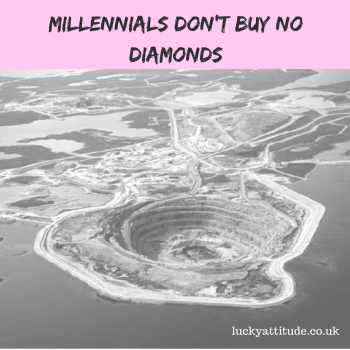Why Millennials Are Killing The Diamond Industry?

Everyone loves to hate Millennials – this annoyingly engaged, woke and authentic generation, who has turned the whole commerce upside down with their ‘entitled’ demands for flexible working arrangements and sustainable work practises.
It’s all Internet’s fault.
Millennials are the first generation that has grown up with the Internet in their own homes, which has given them the power to be both – a producer and a participant of the culture at the same time.
The Internet has led the way to a more equal playing field in the western world.
And because of that, Millennials are more knowledgeable about a wider range of topics and world issues compared to their parents.
Let’s look at how luxury jewellery went Millennial …
Diamonds aren’t Millennials’ best friends
Why Millennials aren’t buying diamonds?
Because 1750 tons of earth must be extracted to find a 1-carat rough diamond — the average engagement ring diamond size is around 1.25 carat 😱
Is one ring worth the destruction?
Here’s your answer.
The development and preparation of diamond mining areas have a disastrous impact on the local environments, people and wildlife.
Habitat loss to make way for roads and railways to transport toxic materials from the mines is killing wildlife. Infrastructure construction means that trees are cleared and local flora is destroyed.
Diamonds are not a need, they are a want.
Mined-diamonds are utterly unnecessary.
Are man-made diamonds perfect alternative?
Fortunately, unlike our parents’ generation, Millennials have a choice. We can choose the source of our diamonds.
The rapidly growing man-made or synthetic diamonds industry is on a course to disrupt the mined-diamond business.
At least that is the conclusion from the Diamond Producers Association’s new marketing campaign “Real Is Rare.”
Ethical and cruelty-free engagement rings set with diamonds can be created in a laboratory.
Buying a ring knowing that no animals lost their habitats or their lives and the environment was not polluted, is best for everyone.
Millennials have a desire and responsibility to make the world better by voting with their wallet.
How Millennials are reshaping the luxury market?
Unlike Baby Boomers, an average Millennial don’t buy luxury to impress others, but to pamper themselves.
We prefer to pamper ourselves with luxurious experiences rather than material things.
Having a shinier bracelet than your neighbour isn’t aspirational any more.
When it comes to jewellery, Millennials don’t mind paying more for ethically sourced unique pieces and support smaller designers.
Their idea of status is not shaped by luxurious and exclusive possessions, but by a commitment to freedom & self-expression.
Brand’s status isn’t accepted at face value. Millennials will dig out the information about your business practices and they will judge you on that.
Ethical and sustainable jewellery brands
Millennials opt for jewellery that match their values and shop from brands that care about integrity.
Jewellery is often bought as a token of love, so it’s important that when we do make that investment – it is a piece of integrity.
Silver is considered ethical because it is recycled.

